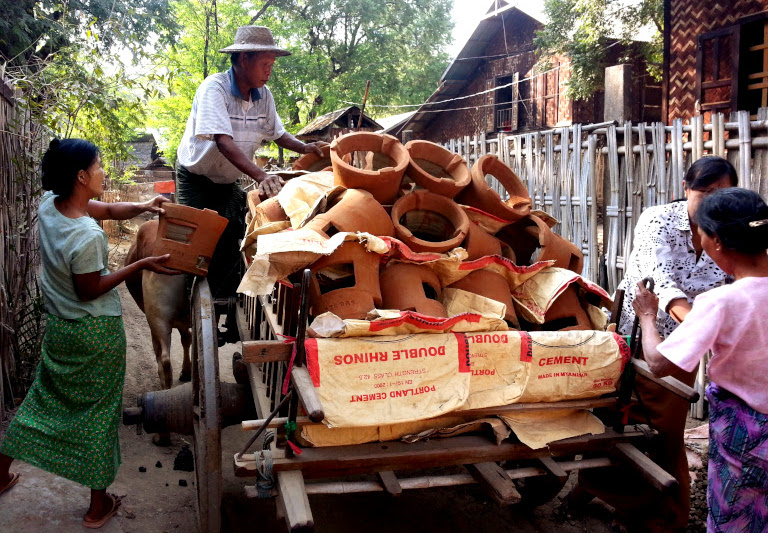Strengthening access to improved cookstoves in Myanmar
To help manage demand for woodfuel, the SCALE (Strengthening improved Cookstove Access towards a better quality of Life and Environment) project aimed to put in place a market-based dissemination mechanism for fuel-efficient improved cookstoves. By working with all actors along the cookstove supply chain, by supporting them through efforts to foster a policy environment that is supportive of positive climate and energy action, and through marketing and promotional initiatives, SCALE facilitated the access to at least 42,000 improved cookstoves by the Myanmar population.
Context and challenges
According to the WHO, 3 million people die each year because of open fire or traditional biomass (firewood and charcoal) cooking devices. In Myanmar, a country of 60 million people, more than 90% of the population relies on biomass and cooks daily with inefficient and highly polluting cookstoves.
- Wood provides for more than 80% of the energy used for cooking. Almost all of the wood used as fuel comes from unsustainable and illegal logging of local forests. Forest degradation has become a major issue in Myanmar, with an annual deforestation rate of 2% (UN FAO 2007). Fuelwood use also increases the burden on women, as they are the household members primarily in charge of collecting firewood, spending more than 200 hours a year on this activity.
- Traditional cookstove production is highly fragmented and not standardized, with consumers rarely having information on the quality, performance or safety of such devices. Cleaner and more efficient alternatives, such as improved cookstoves (ICS), are not widely available.
- Given the size of the cookstove market in Myanmar, there is an opportunity for largescale dissemination of ICS in the country, contributing to the socioeconomic development of individuals and communities through livelihood improvement activities and development of local production and distribution channels.

Objectives and solutions
Building on its proven methodology which enabled the dissemination of 3.5 million ICS in Cambodia in the last decade, Geres teamed up with a local Myanmar organization, Ever Green Group (EGG), to replicate the Cambodian ICS success story in Myanmar by facilitating widescale access to cleaner and more efficient cookstoves.
- Supporting ICS sector development and working with EGG to scale up the production, supply and promotion of improved cookstoves.
- Stimulating domestic demand for ICS.
- Fostering a policy environment that is supportive of positive climate and energy action.
- Results and impact
After more than 4 years of work, SCALE achieved the following results:
- A comprehensive set of data forms the baseline for an informed and coordinated intervention;
- The development of two energy-efficient stoves: San Pya A1 model for firewood and San Pya Pathein model for charcoal. The San Pya A1 compared with an open fire is 35% more fuel efficient and the San Pya Pathein is 25% more efficient compared to a traditional charcoal stove.
- More than 40,000 ICS were produced and disseminated, 32,000 for firewood (San Pya A1) and 8,000 for charcoal (San Pya Pathein);
- 60 SMEs are engaged in the production and distribution of ICS, with sustainable business plans, and contribute to job creation;
- A policy dialog among the key stakeholders is initiated;
According to an impact study carried out at the end of the project, 92% of households indicated to be satisfied with their ICS because of the fuel consumption reduction, which led to 26 hours per year saved for each household and accumulated savings of 210,000 euros. The producers and distributors of ICS also gained an accumulated income of 40,000 euros.
WATCH THE PROJECT VIDEO
Beneficiaries
- 61 craftsmen from improved cooking stoves, including 40 women
- 70 heads of companies distributing and reselling improved cooking stoves, half of whom are women
The employees of the workshops, i.e. about 150 people - More than 100,000 people reached
- 4,000 households using improved cooking stoves
Partners
Technical partners
- Ministère de l’Environnement, de la conservation et des ressources forestières (MoECaF)
- Entreprise sociale EverGreen Group (EGG), Myanmar
- ENERGIA / HIVOS, PaysBas
- StovePlus, programme du Geres
- Institut de Recherche sur les forêts (FRI)
- Association Cambodgienne de Promotion des Foyers de cuisson améliorés (CESPA)
- ONG Mercy Corps, Myanmar
Financial partners
- AUnion Européenne
Agence Française de Développement / - FFEM Fonds Français pour l’Environnement Mondial
- Fondation Lord Michelham of Hellingly
- Fondation Raja – Danièle Marcovici
- Fondation Prince Albert II de Monaco
DOCUMENTS TO DOWNLOAD
Baseline gender assessment report
Myanmar Cookstoves Market Assessment
WOULD YOU LIKE TO TAKE ACTION
AND SUPPORT WHAT WE DO?
Tell us who you are and find your means of action.
